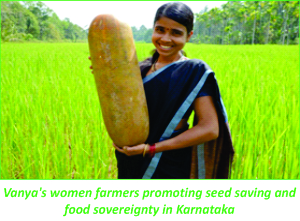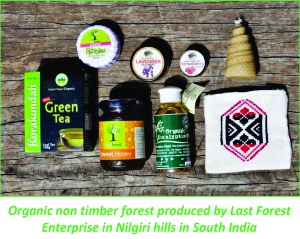Tapping the Green Business Potential
India
is nowadays seen as an emerging market for aspiring micro-commercial
startups. With the population currently at 1.3 billion, India’s surplus is
at a high risk for exceeding its carrying capacity and exhausting its
natural assets. Ecological entrepreneurship helps create easy alternatives
to pre-existing mainstreamed and environment polluting businesses. These
green enterprises are not only drivers for change but can play a significant
role in reducing overall ecological as well as carbon footprints.
Governments, NGOs and even corporations have started helping set up local
enterprises, using the concept of a bottom-up landscape based approach
paving a roadway towards reducing unemploym ent
in the country.
ent
in the country.
One such social and local small-scale enterprise is Vanya created by Vanastree, an organisation encouraging food security and enhancement of biodiversity through conservation of traditional seeds. Vanya is the livelihood-programme-turned-enterprise comprising of women farmers in the Malnad region of Karnataka. The collective strives for ex-situ conservation of biodiversity by making women the sole seed savers responsible for sale of products from their home-garden, forest and fields. Vanya creates a triple bottom line impact through women empowerment, apart from facilitating a local economy aiming at education, sustainable use and documentation of traditional knowledge coupled with contemporary information.
Another small-farmer based enterprise working on
the principles of sustainable use of biodiversity is Last Forest Enterprise.
Keystone Foundation established the green enterprise in the Nilgiri Hills
through a chain set up of retail shops with a focus on addressing
livelihood, value based conservation and enterprise concerns altogether.
Currently, its outreach has grown with marketing and selling Non Timber
Forest Products (NTFPs). This green enterprise impacts thousands of people
and retains local indigenous knowledge.
conservation and enterprise concerns altogether.
Currently, its outreach has grown with marketing and selling Non Timber
Forest Products (NTFPs). This green enterprise impacts thousands of people
and retains local indigenous knowledge.
Both these small-scale enterprises faced a lot of challenges in terms of time management, looking for investors and asking people to join. Even today, Vanya faces the struggle of insufficient financial resources to expand its geographic strength but its impact is so strong that it has managed to create a local economy for women and promote food sovereignty in the region.
Local and green businesses evolving in the current ecosystems are often faced with the perplexity of “using nature” yet they have become nominated towards building a new trajectory for a vibrant India in the hope of inclusive ecological sustainability. Green entrepreneurship provides an opportunity to deliver ecological and innovative solutions, alleviate poverty and thereby support Sustainable Development Goals (SDGs). Ecosystems now require value based creation, educate the upcoming generations and build failure resilience. ■
References:
-
Jha, Srivardhini. (2018). Entrepreneurial ecosystem in India. IIMB Management Review. 30. 10.1016/j.iimb.2018.04.002.
-
Development Alternatives. (n.d.). Retrieved December 18, 2019, from Mainstreaming Alternative Perspectives: http://map-sa.net/Document/Doc/20131213-14-50-14.pdf
-
Development Alternatives. (n.d.). Vanya. Retrieved December 18, 2019, from Mainstreaming Alternative Perspectives: http://map-sa.net/Document/Doc/20131217-14-48-01.pdf
-
Doyle, B., & Wildt, C. (2013). BLOG: Ecological Entrepreneurship: The Key to a Sustainable Future? Retrieved December 12, 2019, from THE BARD CEP ECO READER: https://www.bard.edu/ cep/blog/?p=5282
-
KORRECK, S. (2019). The Indian Startup Ecosystem: Drivers, Challenges and Pillars of Support . Observer Research Foundation.
Srishti Manna
smanna@devalt.org